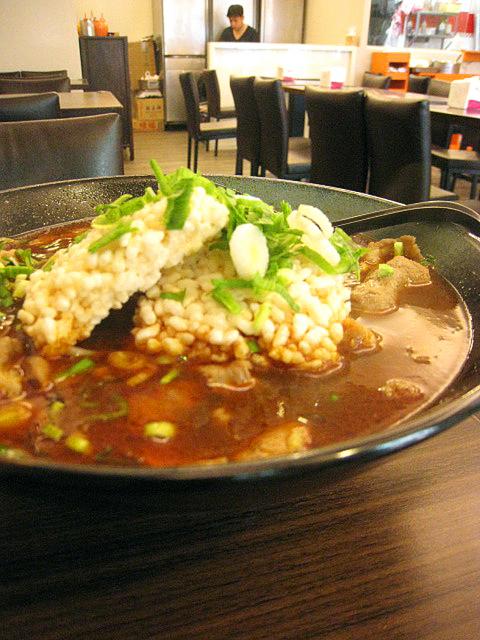With cold weather gradually settling in, thoughts turn to a good hot pot, particularly the sharp heat of chili and the tingle-inducing Sichuan pepper (Zanthoxylum piperitum).
Chili hot pots, or indeed any kind of hot pot, are best enjoyed in the company of three or four people, but such social gatherings are not always possible when the yen for fiery food hits.
One solution is a visit to Han Chi Tiger Noodles (韓記老虎麵食館), an establishment that opened nearly two decades ago and last year relocated to Jinhua Street on the fringes of the Yongkang Street shopping district.

Photo: Ian Bartholomew, Taipei Times
Han Chi’s tiger noodles (老虎麵), the house specialty, are appropriately named: they have a fierce bite.
The tiger noodles come in beef, chicken, mutton or pork, and are served with lamian (拉麵), vermicelli noodles (冬粉) or crispy rice (鍋巴), and in four levels of spiciness.
Whatever your choice, the bowl is NT$180.
I picked the third level of spiciness, expecting a lively number, but previous experience with spicy food in Taiwan prevented expectations from soaring too high.
Lashings of hot but otherwise flavorless chili oil and over-salted preserved chili sauce are the quick and easy way many a restaurant spices up its fare.
A mouthful of soup is often enough to see through the sham, for while the bowl of noodles is red and burns the tongue, there really isn’t that much going on flavorwise.
Han Chi’s tiger noodles are quite another proposition. The dish certainly lit a fire in my mouth, but beyond the burning there was a depth of flavor and layers of spiciness.
The quality of a good chili stock is like a fine wine, with the characteristics of different types of peppers working their way to the fore as you eat.
Having sampled tiger noodles in a number of combinations, the pork seems to work best as the meat is able to draw in the chili and impart some of its own flavor as well.
The quality of the noodles is excellent, but for something a little unusual, one version is served with blocks of crisp rice — something like savory Rice Krispies treats — that are excellent for soaking up rich sauces. Tiger noodles are served with jellied duck blood and tofu skin, both classic accompaniments. (The former can be omitted on request.)
Han Chi’s third level of spiciness exceeds anything in the “medium hot” category of many local restaurants — the fourth level should only be chosen by masochists. Sweat-soaked collars — even when the mercury dips — are far from a rare occurrence at Han Chi.
The restaurant offers many other dishes, not all of them so hot. Its clear beef broth (清燉湯麵, NT$90, or NT$150 with added beef, 清燉牛肉麵) is full of flavor, and its Sichuan-style fried sauce noodles (川式炸醬麵, NT$75) and shaoshao noodles (紹燒麵, NT$75) — a variation on the more typical dandan noodles (擔擔麵) — are both toothsome. Both rely for effect on the high quality of the noodles and a careful preparation of condiments, rather than on a chili bite.
The side dishes at Han Chi should not be neglected, with abalone mushrooms stewed in soy (NT$50) and stewed pig’s intestine (NT$100) deserving special mention for outstanding flavor and texture. A sweet mung bean soup is offered free of charge and is ideal for bringing down the internal temperature.

The primaries for this year’s nine-in-one local elections in November began early in this election cycle, starting last autumn. The local press has been full of tales of intrigue, betrayal, infighting and drama going back to the summer of 2024. This is not widely covered in the English-language press, and the nine-in-one elections are not well understood. The nine-in-one elections refer to the nine levels of local governments that go to the ballot, from the neighborhood and village borough chief level on up to the city mayor and county commissioner level. The main focus is on the 22 special municipality

The People’s Republic of China (PRC) invaded Vietnam in 1979, following a year of increasingly tense relations between the two states. Beijing viewed Vietnam’s close relations with Soviet Russia as a threat. One of the pretexts it used was the alleged mistreatment of the ethnic Chinese in Vietnam. Tension between the ethnic Chinese and governments in Vietnam had been ongoing for decades. The French used to play off the Vietnamese against the Chinese as a divide-and-rule strategy. The Saigon government in 1956 compelled all Vietnam-born Chinese to adopt Vietnamese citizenship. It also banned them from 11 trades they had previously

Jan. 12 to Jan. 18 At the start of an Indigenous heritage tour of Beitou District (北投) in Taipei, I was handed a sheet of paper titled Ritual Song for the Various Peoples of Tamsui (淡水各社祭祀歌). The lyrics were in Chinese with no literal meaning, accompanied by romanized pronunciation that sounded closer to Hoklo (commonly known as Taiwanese) than any Indigenous language. The translation explained that the song offered food and drink to one’s ancestors and wished for a bountiful harvest and deer hunting season. The program moved through sites related to the Ketagalan, a collective term for the

As devices from toys to cars get smarter, gadget makers are grappling with a shortage of memory needed for them to work. Dwindling supplies and soaring costs of Dynamic Random Access Memory (DRAM) that provides space for computers, smartphones and game consoles to run applications or multitask was a hot topic behind the scenes at the annual gadget extravaganza in Las Vegas. Once cheap and plentiful, DRAM — along with memory chips to simply store data — are in short supply because of the demand spikes from AI in everything from data centers to wearable devices. Samsung Electronics last week put out word